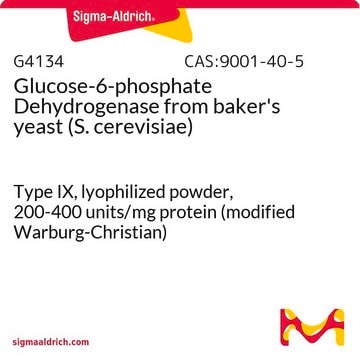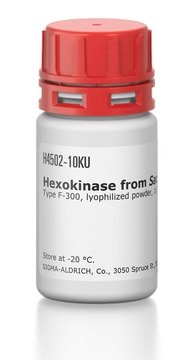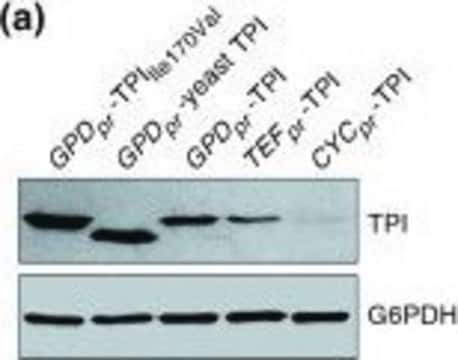G7877
Glucose-6-phosphate Dehydrogenase from baker′s yeast (S. cerevisiae)
Type VII, ammonium sulfate suspension, ≥200 units/mg protein
Sinónimos:
glucose-6-phosphate dehydrogenase (NADP+), G-6-P-DH, Zwischenferment
About This Item
Productos recomendados
biological source
bakers yeast
Quality Level
type
Type VII
form
ammonium sulfate suspension
specific activity
≥200 units/mg protein
mol wt
128 kDa
technique(s)
cell based assay: suitable
solubility
water: soluble
application(s)
diagnostic assay manufacturing
storage temp.
2-8°C
Gene Information
Saccharomyces cerevisiae ... ZWF1(855480)
¿Está buscando productos similares? Visita Guía de comparación de productos
Categorías relacionadas
General description
Application
Biochem/physiol Actions
Unit Definition
Physical form
signalword
Danger
hcodes
pcodes
Hazard Classifications
Resp. Sens. 1
Storage Class
11 - Combustible Solids
wgk_germany
WGK 3
flash_point_f
Not applicable
flash_point_c
Not applicable
ppe
Eyeshields, Gloves, type N95 (US)
Certificados de análisis (COA)
Busque Certificados de análisis (COA) introduciendo el número de lote del producto. Los números de lote se encuentran en la etiqueta del producto después de las palabras «Lot» o «Batch»
¿Ya tiene este producto?
Encuentre la documentación para los productos que ha comprado recientemente en la Biblioteca de documentos.
Los clientes también vieron
Artículos
Instructions for working with enzymes supplied as ammonium sulfate suspensions
Protocolos
To measure glucose-6-phosphate dehydrogenase activity, beta-nicotinamide adenine dinucleotide phosphate is used in a spectrophotometric rate determination assay at 340 nm.
Nuestro equipo de científicos tiene experiencia en todas las áreas de investigación: Ciencias de la vida, Ciencia de los materiales, Síntesis química, Cromatografía, Analítica y muchas otras.
Póngase en contacto con el Servicio técnico











